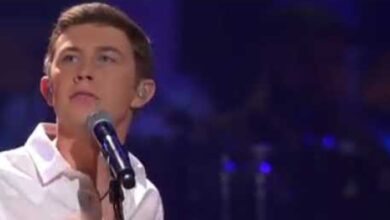Keith’s acoustic “Flowers On The Wall” tribute proves he can sing anything, deeply missed, in Heaven’s choir
The Statler Brothers, originally formed as a gospel quartet in 1955 by brothers Harold Reid, Don Reid, Phil Balsley, and Lew DeWitt, eventually transitioned into country music in the early 1960s. Their distinctive four-part harmonies and storytelling lyrics quickly garnered attention, propelling them to success in both the country and pop music charts. “Flowers on the Wall,” penned by Lew DeWitt, stands out as one of their signature hits, released in 1965. The song’s unique blend of catchy melodies and introspective lyrics resonated with audiences, earning it widespread acclaim and cementing the group’s place in country music history.
Harold Reid, known for his deep bass voice and charismatic stage presence, played a pivotal role in The Statler Brothers’ success. Beyond his vocal contributions, Harold often served as the group’s comedic anchor during live performances, adding a lighthearted touch to their shows. His personality and musical talents helped define the group’s identity and contributed to their enduring popularity over the decades.
In 2020, the passing of Harold Reid marked a poignant moment for fans and fellow musicians alike. Toby Keith, a prominent figure in contemporary country music known for his chart-topping hits and robust vocal delivery, paid homage to Harold’s legacy with a heartfelt acoustic rendition of “Flowers on the Wall.” Keith’s decision to revisit the song in a stripped-down format showcased his reverence for the original composition and his appreciation for The Statler Brothers’ musical contributions.
Keith’s rendition of “Flowers on the Wall” resonated deeply with audiences, emphasizing the timeless quality of the song and its enduring emotional resonance. The acoustic arrangement allowed the lyrics to take center stage, highlighting themes of reflection and nostalgia that are universal to the human experience. Through his interpretation, Keith not only honored Harold Reid’s memory but also celebrated the enduring impact of The Statler Brothers on country music.
The choice to cover a classic like “Flowers on the Wall” underscores Toby Keith’s appreciation for traditional country music and his commitment to preserving its heritage. His rendition served as a reminder of the genre’s rich storytelling tradition and its ability to evoke profound emotions through simple yet poignant lyrics. By paying homage to Harold Reid and The Statler Brothers, Keith demonstrated the interconnectedness of artists within the country music community and the respect they hold for each other’s contributions.
Harold Reid’s influence extended far beyond his role in The Statler Brothers. As a songwriter, performer, and storyteller, he left an indelible mark on the genre, inspiring generations of musicians to embrace the authenticity and narrative depth that characterize classic country music. Toby Keith’s tribute performance not only honored Harold’s legacy but also introduced younger audiences to the enduring appeal of songs like “Flowers on the Wall” and their ability to transcend generational boundaries.
The enduring popularity of “Flowers on the Wall” speaks to its status as a timeless classic within the country music canon. The song’s success on both country and pop charts upon its release in the 1960s reflects its broad appeal and ability to resonate with diverse audiences. Toby Keith’s interpretation of the song in 2020 served as a poignant reminder of its enduring relevance and the lasting impact of The Statler Brothers’ music on the fabric of American music culture.
In conclusion, Toby Keith’s acoustic rendition of “Flowers on the Wall” stands as a heartfelt tribute to Harold Reid and a celebration of The Statler Brothers’ enduring legacy. Through his performance, Keith honored the timeless quality of the song and its significance within the country music genre. His homage underscored the deep respect and admiration that exists among artists within the country music community and highlighted the enduring power of classic songs to evoke emotion and connect listeners across generations.





